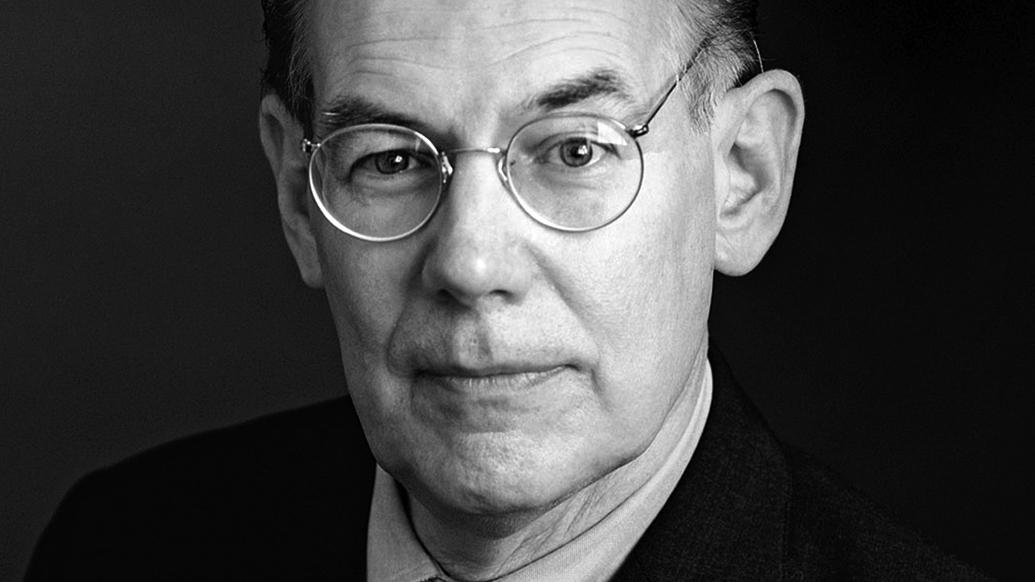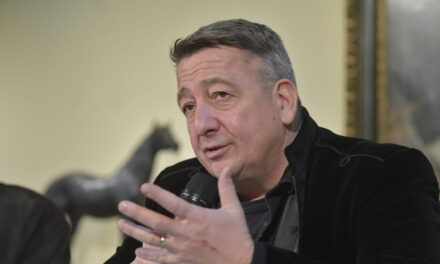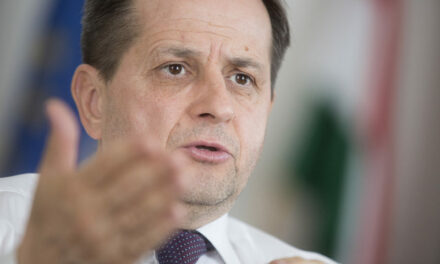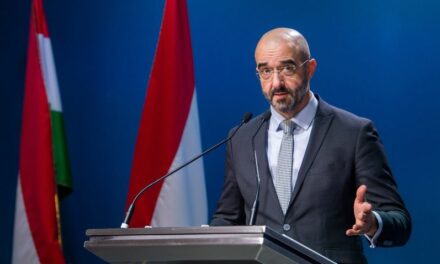John J. Mearsheimer, a professor at the University of Chicago, explained in his speech at the European University Institute (EUI) in Florence that the United States is primarily responsible for the crisis in Ukraine, but he also analyzed the causes and expected consequences of the war in detail.
His most important findings are reviewed below, his full speech can be read on The National Interest.
Causes and consequences of the crisis in Ukraine
The war in Ukraine is a multidimensional disaster that is likely to get worse in the foreseeable future. When a war is successful, little attention is paid to its causes, but if the end result is disastrous, what is most important is understanding how it happened? People want to know: how did we get into this terrible situation? I have witnessed this phenomenon twice in my life - first in the Vietnam War, second in the Iraq War. In both cases, the Americans wanted to know how their country could calculate so badly.
First, the United States is responsible for causing the crisis in Ukraine.
This is not to deny that Putin started the war, nor that America's allies are also responsible, although they largely follow Washington's lead. My main claim is that the United States has pursued a Ukraine policy that Putin and the Russian leadership consider an existential threat, as they have been saying for years. Specifically, I'm talking about America's obsession with getting Ukraine into NATO and making it a bulwark of the West. The Biden administration has refused to end this threat diplomatically, and in 2021 has recommitted to Ukraine's admission to NATO. Putin responded to this with the February 24 invasion.
Second, the Biden administration and its Western allies are committed to defeating Russia and are using comprehensive sanctions to weaken Russian power. The United States has absolutely no interest in a diplomatic solution to the war, which means it will likely drag on for months, if not years. the United States is essentially driving it down this path There is also the danger of the war escalating, if NATO is involved in the fighting, nuclear weapons may also be used. We live in dangerous times.
Putin is widely and convincingly believed in the West to be solely responsible for causing the crisis in Ukraine and the ongoing war.
He is said to have imperial ambitions, meaning he seeks to conquer Ukraine and other countries - all to create a greater Russia somewhat similar to the former Soviet Union. In other words, Ukraine is Putin's first target, but not his last. As one scholar put it, he is "acting for a sinister, long-cherished goal: to wipe Ukraine off the world map." Given Putin's purported goals, it makes perfect sense for Finland and Sweden to join NATO and for the alliance to increase its forces in Eastern Europe. Imperial Russia must be contained after all.
While this narrative is repeated over and over by the mainstream media and virtually every Western leader, there is no evidence to support it. Some emphasize that, according to Putin, Ukraine is an "artificial state" or not a "real state". However, such opaque comments say nothing about why he went to war. The same is true of Putin's statement that he sees Russians and Ukrainians as "one people" with a shared history. Others point out that he called the collapse of the Soviet Union "the greatest geopolitical disaster of the century." But Putin also said:
"He who does not miss the Soviet Union has no heart. Anyone who wants to get it back has no brains.”
However, others point to a speech in which he declared that "Modern Ukraine was created entirely by Russia, or more precisely by Bolshevik, Communist Russia." But as he continued in the same speech, referring to Ukraine's independence today: "Of course, we cannot change the events of the past, but we must at least openly and honestly acknowledge them."
So there is no evidence that Putin intended to make Ukraine a part of Russia when he launched his troops on February 24, but there is evidence that he recognized it as an independent country.
In his July 12, 2021 article on Russian-Ukrainian relations, often cited as evidence of his imperial ambitions, he tells the Ukrainian people: "They want to create their own state: welcome!" On how Russia should treat Ukraine, he writes: "There is only one answer: respect." He concludes the lengthy article with the following words: “And what will become of Ukraine? - that is decided by its citizens." It is difficult to reconcile these statements with the claim that he wants to integrate Ukraine into an even greater Russia.
In the same article of July 12, 2021, as well as in his important speech on February 21 this year, Putin emphasized that Russia accepts "the new geopolitical reality that took shape after the collapse of the Soviet Union." He repeated the same for the third time on February 24, when he announced that Russia would attack Ukraine. He specifically stated that "our plan is not to occupy the territory of Ukraine" and made it clear that he respects Ukraine's sovereignty, but only up to a certain point: "Russia cannot feel safe, cannot develop and cannot exist while facing a constant threat from the territory of today's Ukraine." In a word
he was not interested in Ukraine becoming part of Russia; he was interested in not being a "springboard" for Western aggression against Russia
which topic I will talk about in more detail soon.
One could argue that Putin lied about his motives or tried to cover up his imperial ambitions. I wrote a book about lying in international politics - Why Leaders Lie: The Truth About Lying in International Politics - and it is clear to me that Putin did not lie. First, one of my main findings is that leaders don't lie to each other much; they lie more often to their own public. As for Putin, whatever we think of him, he has not lied to other leaders, and in fact, he has publicly expressed his thoughts on Ukraine on numerous occasions over the past two years, consistently emphasizing that his main concern is Ukraine's relationship with the West, especially NATO. Not once did he hint that he wanted to make Ukraine a part of Russia. If this behavior was part of a massive deception campaign, it would be unprecedented in history.
The Russian president was an invited guest at the NATO summit in Bucharest in April 2008, where the alliance announced that Ukraine and Georgia would eventually become members. Putin's opposition to this announcement did not sway Washington because Russia was deemed too weak to stop further NATO expansion, just as it had stopped the expansion waves of 1999 and 2004.
In this context, it is important to note that the expansion of NATO before February 2014 was not aimed at containing Russia, because Moscow was not in a position to pursue a revanchist policy in Eastern Europe. Tellingly, former US ambassador to Moscow Michael McFaul notes that Putin had no plans to seize Crimea before the crisis erupted in 2014; it was an impulsive move in response to the coup that toppled Ukraine's pro-Russian leader. In short, NATO enlargement was not intended to contain the Russian threat, but to serve as part of a broader policy of extending the liberal international order to Eastern Europe and pulling the entire continent toward Western Europe.
But when the Ukraine crisis erupted in February 2014, the United States and its allies suddenly denounced Putin as a dangerous leader with imperial ambitions and Russia as a serious military threat that needed to be contained. What caused this turn of events? The new rhetoric served one basic purpose: it allowed the West to blame Putin for the outbreak of the conflict in Ukraine. And now that the crisis has escalated to full scale, this is even more true: he alone is blamed for the disastrous turn. And the recriminations explain why he is now widely portrayed as an imperialist here in the West, even though this perspective is hardly supported by evidence.
The real cause of the problem
The root of the crisis is the effort of the American leadership to make Ukraine a Western bulwark. This strategy has three parts: integrating Ukraine into the EU, transforming Ukraine into a pro-Western liberal democracy, and most importantly, integrating Ukraine into NATO. Following the NATO summit in Bucharest in 2008, according to a respected Russian journalist, Putin was “furious” and warned that “if Ukraine joins NATO, it will do so without Crimea and the eastern regions.
It will just fall apart.”
William Burns, who is now the head of the CIA but was the US ambassador to Moscow at the time of the Bucharest summit, wrote a memo to then-Secretary of State Condoleezza Rice that succinctly summarized the Russians' views on all this. In his words:
"Ukraine's entry into NATO is a bright red line for the Russian elite (not only Putin). In more than two-and-a-half years of conversations with key Russian actors—from those hiding in the dark recesses of the Kremlin to Putin's staunchest liberal critics—I have yet to find anyone who sees Ukraine's accession to NATO as anything other than a direct threat to Russian interests.
Today's Russia will respond. Russian-Ukrainian relations are deeply frozen, and this provides fertile ground for Russian interventions in Crimea and eastern Ukraine.”
Of course, Burns was not the only decision-maker who understood the dangers of Ukraine's joining NATO. At the summit in Bucharest, both German Chancellor Angela Merkel and French President Nicolas Sarkozy opposed the promotion of Ukraine's NATO membership, because they understood that it would alarm and anger Russia. Merkel recently expressed her opposition: “I was very sure ... that Putin would not let this happen. From his point of view, that would be a declaration of war.” But the Bush administration paid little heed to Moscow's "shining red line" and pressured French and German leaders to agree to a joint statement declaring that Ukraine and Georgia would eventually join the alliance.
Not surprisingly, the intention to integrate Georgia into NATO resulted in a war between Georgia and Russia in August 2008 – four months after the Bucharest Summit. Despite this, the United States and its allies have not changed their policy towards Ukraine. These efforts eventually led to a major crisis in February 2014, after a US-backed uprising forced the pro-Russian president of Ukraine, Viktor Yanukovych, to flee the country. In response, Russia seized Crimea and contributed to the civil war between pro-Russian separatists and the Ukrainian government in the Donbas region of eastern Ukraine.
It is often argued that in the eight years between the outbreak of the crisis in February 2014 and the outbreak of war in February 2022, the United States and its allies paid little attention to Ukraine's accession to NATO. In practice, the issue was taken off the table, so NATO expansion could not be an important reason for the escalating crisis in 2021 and the subsequent war that broke out at the beginning of the year. However, this argument is false.
Indeed, the Western response to the events of 2014 was to reinforce the existing strategy and draw Ukraine even closer to NATO.
The alliance began training the Ukrainian army in 2014, training an average of 10,000 soldiers per year over the next eight years. In December 2017, the Trump administration decided to supply Kiev with "defensive weapons". Other NATO countries soon jumped into action and shipped even more weapons to Ukraine.
The army of Ukraine also participated in the joint military exercises of NATO forces. In July 2021, Kiev and Washington jointly organized the Operation Sea Breeze naval exercise in the Black Sea, in which the navies of 31 countries participated. Two months later, in September 2021, the Ukrainian military conducted Rapid Trident 21 , which the US military described as "an annual exercise aimed at enhancing interoperability between allied and partner nations, demonstrating that units are ready and willing to respond to any crisis". NATO's efforts to arm and train Ukraine's military go a long way to explaining why they fared so well against Russian forces. As a headline in The Wall Street Journal puts it:
"The Secret of Ukraine's Military Success: Years of NATO Training".
President Zelensky, who has never shown much enthusiasm for Ukraine's NATO membership, changed course in early 2021 and not only supported NATO expansion, but now pursued a hard-line policy towards Moscow. He has taken a number of actions — including shutting down pro-Russian TV stations and accusing one of Putin's close friends of treason — that are sure to anger Moscow. President Biden, who moved into the White House in January 2021, has long been committed to Ukraine's admission to NATO, so it's no surprise that on June 14, 2021, NATO issued the following statement at its Brussels summit:
We confirm the decision taken at the Bucharest summit in 2008 that Ukraine will become a member of the Alliance with the Membership Action Plan (MAP) as an integral part of the process; we confirm all elements of the decision. We firmly support Ukraine's right to decide its own future and foreign policy direction, free from outside interference.
In short, there is no doubt that since the beginning of 2021, Ukraine has moved rapidly towards NATO accession. Yet some proponents of this policy argue that Moscow should not have worried because "NATO is a defense alliance and poses no threat to Russia." But that's not how Putin and other Russian leaders think about NATO, and what they think matters. There is no question that Ukraine's NATO accession remains a "shining red line" for Moscow.
On December 17, 2021, Moscow sent a letter to the Biden administration and NATO, demanding written guarantees that: 1) Ukraine would not join NATO, 2) no offensive weapons would be stationed near Russia's borders, and 3) the NATO troops and equipment withdraw to Western Europe.
Speaking to the Directorate of the Ministry of Defense on December 21, 2021, Putin stated that
"What is being done, tried or planned in Ukraine is not happening thousands of kilometers from our country's border. It's on our doorstep. They must understand that we simply have nowhere to retreat. Do they really think we don't see these threats? Or do they think we are just passively watching the threats to Russia?
Two months later, at a press conference on February 22, 2022, a few days before the outbreak of war, he stated: "We are firmly opposed to Ukraine joining NATO, because it represents a threat to us that we can support with arguments. I have spoken about this in this room several times." He then made it clear that he recognized
Ukraine becomes a de facto member of NATO.
The United States and its allies, he said, “continue to pump the current leadership in Kiev with modern types of weapons. This is completely unacceptable.”
Putin's logic should be clear to Americans, who have long been committed to the Monroe Doctrine, which states that no distant superpower can station its military forces in the Western Hemisphere.
But Foreign Secretary Antony Blinken responded to Russia's demands in mid-December simply saying: “There is no change. There will be no change.” Putin then launched an invasion of Ukraine to eliminate the threat he saw in NATO.
Where are we now and where are we going?
I regret to say that I do not see how this war can end any time soon, and this view is shared by prominent political decision-makers such as General Mark Milley, President of the JCS and NATO Secretary General Jens Stoltenberg. The main reason for my pessimism is that both Russia and the United States are deeply committed to winning the war, and
it is impossible to create a win-win arrangement.
More specifically, from Russia's point of view, the key to the settlement is to make Ukraine a neutral state, ending Kiev's integration with the West. But this result is unacceptable to the Biden administration and much of American foreign policy, because it would mean a victory for Russia.
There is also little chance that Kiev will push for neutralization, because Ukrainian ultranationalists with significant political power have no interest in giving in to any Russian demand, especially one that dictates Ukraine's foreign policy. The Biden administration and the countries of NATO's eastern flank, such as Poland and the Baltic states, are likely to support Ukraine's ultranationalists on this issue.
To complicate matters further, how to deal with the Ukrainian territories conquered by Russia since the beginning of the war, as well as the fate of Crimea? It is hard to imagine Moscow willingly giving up any of the territory it now occupies, much less all of it, as Putin's territorial goals today are unlikely to be the same as before the war. But it's equally hard to imagine any Ukrainian leader accepting a deal that would allow Russia to keep any Ukrainian territory, except possibly Crimea. I hope I'm wrong, but that's why I don't see an end to this destructive war.
There is also the possibility of nuclear weapons being used in Ukraine, which could even lead to a nuclear war between Russia and the United States.
The stakes are so high for both sides that neither side can afford to lose.
Ukraine's accession to the West is an existential threat to Russia that must be eliminated. In practical terms, this means that Russia must win the war in Ukraine. Defeat is unacceptable. The Biden government, on the other hand, emphasized that its goal is not only the final defeat of Russia in Ukraine, but also to cause serious damage to the Russian economy with the sanctions.
Obviously, both sides cannot win. And here is a perverse paradox: the more successful the United States and its allies are in achieving their goals, the more likely the war will go nuclear.
There will probably be other catastrophic consequences of this war, such as the worldwide food crisis, the issue of Western-Russian relations, the issue of deep underground cracks between Eastern and Western European countries, damage to the world economy, i.e. an "economic hurricane".
In conclusion, the ongoing conflict in Ukraine is a colossal disaster that, as I noted at the beginning of my presentation, is prompting people around the world to seek its causes. Those who believe in facts and logic will quickly realize that the United States and its allies are primarily responsible for this. It was initiated by the Bush administration, but whenever possible, the Obama, Trump and Biden administrations did not hesitate to counter this policy, and America's allies dutifully followed Washington's example. Despite the fact that Russian leaders have made it abundantly clear that Ukraine's entry into NATO would be a crossing of a "glowing red line," the United States has refused to consider Russia's deepest security concerns. The tragic truth is that if the West had not pushed for NATO expansion in Ukraine, it is unlikely that there would be a war in Ukraine today and that Crimea would still be part of Ukraine.
In essence, Washington played the central role in leading Ukraine to destruction.
History will judge the United States and its allies harshly for their extremely foolish policy toward Ukraine.












